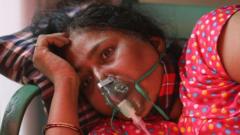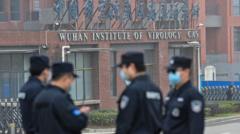Over 370 million people depend on medical oxygen for health care annually, yet less than a third receive it, especially in low-income nations. Experts stress urgent interventions are required to address this global shortage.**
A Global Crisis: The Alarming Shortage of Medical Oxygen**

A Global Crisis: The Alarming Shortage of Medical Oxygen**
Millions are suffering from a critical lack of medical oxygen worldwide, as new reports highlight a growing health crisis.**
At the peak of the Covid-19 pandemic, a significant number of individuals in developing countries died in hospitals due to a stark absence of medical oxygen—a vital resource. According to a new report released by a panel of experts, more than 370 million people globally need oxygen as part of their medical treatment each year, yet fewer than one in three actually receive it. This shortage poses a severe threat to global health, particularly in low- and middle-income nations.
Dr. Hamish Graham, a pediatrician and one of the report's lead authors, emphasized the urgent need for improved access to medical oxygen, stating, "We know that there’s more epidemics coming, and there’ll be another pandemic, probably like Covid, within the next 15 to 20 years." This assessment highlights the critical importance of preparing for future health crises, particularly concerning sufficient oxygen supplies.
The report, published in The Lancet Global Health, follows recent actions by the Trump administration to freeze foreign aid programs, which could have supported efforts to enhance access to medical oxygen. Increasing the availability of this essential medical resource would demand an estimated investment of about $6.8 billion. However, Carina King, an infectious disease epidemiologist at the Karolinska Institute and fellow author of the report, cautioned that amidst current political and economic challenges, securing this funding may prove difficult.
Nevertheless, King insisted that both governments and funding organizations must prioritize medical oxygen due to its critical role across various aspects of healthcare. Oxygen is required not only for patients with pneumonia and other respiratory ailments but also for those battling severe infections like malaria and sepsis, for surgical procedures, and for individuals managing chronic lung disorders.
In conclusion, without timely intervention and investment, the predicted resurgence of infectious diseases could exacerbate this already dire situation, leaving millions vulnerable and in dire need of this life-sustaining resource.






















